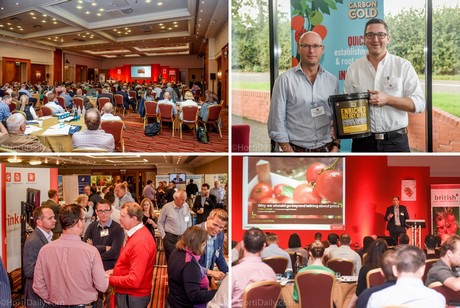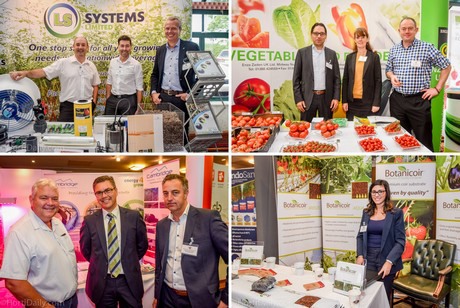
After a well-attended 2nd edition of the Growsave event prequel to the Wednesday night dinner, the conference was kicked off on Thursday morning with a welcome from TGA Chairman Bernard Sparkes and Phil Pearson of APS Salads. James MacPhail of keynote sponsor Carbon Gold followed with a presentation on the trial results of the use of enriched biochar in both conventional and organic crops. Over the last four seasons, Carbon Gold set out 35 ha of trials in 9 European countries. The average yield increase in conventional crops was 7,2% while organic growers saw their yields increase with 11%.
Challenging to buy British?
Commercial and marketing stood central during the morning part of the conference; Ollie Loyd, an international marketing consultant and founder of The Great British Chefs gave some insight in how the giant reach of their online platform can be successfully used to inspire UK ‘foodies’ to buy British tomatoes.Loyd’s platform informs thousands of food enthusiasts why they should eat healthy and better quality products. As well as this it is an engaging network that reaches out to both chefs and consumers to make them more aware of British produce.
The marketing consultant explained how they use social media to promote British products and how they influence and inspire people to buy British tomatoes during an event like the British Tomato Week. Its challenging to give people a reason why they should buy British, but according to Lloyd it is key to engage consumers and chefs and make them more aware of the product by show them the sector and inviting people to farms.
State of the UK Tomato Retail
Chris Cowan of Kantar’s Worldpanel’s Produce Team gave some insight in what is going on and what to expect in UK fresh produce retail. Cowan provided many figures on the British consumer’s shopping behavior and paid special attention to the rise of discounter Aldi. His figures for British growers are looking good; overall, UK households are buying more produce this year compared to last year. The overall tomato sales grew by 2,4% and saw an increase in volume of 2,2 %. Plum Baby tomatoes are a standout performer in these figures in regards to variety and are big contributor to this overall growth. More about his presentation will be published in our newsletter this week.Energy
With his annual review to show what is happening in the UK energy sector price-wise, Chris Placket of FEC is becoming like part of the furniture at the TGA Conference. Beside market updates, Placket also gave an update on the chances and opportunities in regards to governmental changes, rebate schemes and subsidies. Also more about his presentation in our newsletter later on.Education
Chris Baldwin, Operations Director at APS Salads, was speaking about how to captivate children to cultivate. Baldwin discussed the importance of educating kids about the science of growing and showing them where their food comes from. He explained what kind of role growers can play in this, by for example, participating in programs like STEM or an event like the Science Jamboree, where APS showed children the scientific side of food production and how important it is to people.Brexit
Brexit was a much discussed topic during the breaks on the trade show floor. Aside from the industry being influenced by fluctuation in exchange rates, much is still unclear what the outcome of the referendum will really bring for the UK tomato growers. Will there be more chances for local production, difficulty to source workers or less availability in crop protection?
Chris Hartfield of the National Farmers Union gave an update on the NFU's work to develop a Brexit framework and shape policy as it develops. Hartfield, the NFU's Horticultural Policy Adviser had a series of meetings with the UK government, departments and officials to discuss important topics like immigration. As well as this they are in the process of digesting industry feedback and response to form the framework. Labour, crop protection, trade and plant health are their four key priorities.

Click here for our complete photo recap of the 2016 British Tomato Conference
